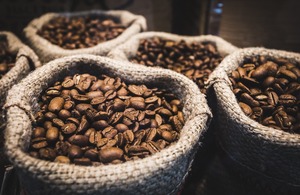GC team work on isotope ratio analysis of coffee beans
Government Chemist scientists publish research work on the analysis of isotopic composition of coffee beans as a marker of regional origin to combat food fraud

Consumers need to have access to food that is safe, nutritious and is what the label says it is. Food fraud, including economically motivated adulteration, presents a challenge to ensuring food authenticity. This is particularly an issue with foods of high economic value such as coffee, one of the most commercialised and widely consumed beverages in the world.
Isotope ratio analysis is a valuable tool that can be used for food authenticity testing. Government Chemist scientists at the National Measurement Laboratory at LGC have published their research work in collaboration with the British Coffee Association, on the effect of roasting on the boron isotopic composition of coffee beans.
Boron (11) isotope values of green and roasted coffee beans from 20 locations worldwide were studied with the aim to investigate boron isotope fractionation during roasting.
The study showed that boron isotopic composition of roasted coffee can be used as a marker of regional differences in coffee origin.
Access paper: https://doi.org/10.1016/j.foodchem.2023.138128
For more information about the work of the Government Chemist please contact: